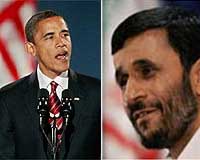 |
Geneva (AFP) June 4, 2009 Russia and the United States had "productive" talks on cutting their nuclear arsenals, the senior US negotiator said on Thursday as the two sides arranged to meet again this month. Russian and US disarmament negotiators agreed at Geneva talks this week "to hold the next round of talks in the second half of June," the Russian Foreign Ministry said in a statement. US Under Secretary of State for Arms Control Rose Gottemoeller told the international Conference on Disarmament that the two nuclear powers were seeking to reduce weapons numbers below levels set in the 1991 Strategic Arms Reduction Treaty (START). "President Obama and Russian President Medvedev have instructed that the new agreement achieve reductions lower than those in existing arms control agreements, and that the agreement should include effective verification measures drawn up from our experience in implementing START," she said. "We have been here in Geneva for the past three days with the US delegation, engaged in productive talks with our Russian counterparts, working towards a START follow-on agreement," Gottemoeller added. Russian and US negotiators on Wednesday ended their second round of talks on replacing the treaty, which expires on December 5, amid a thaw in relations between the two powers. The confidential negotiations are meant to feed in to a summit between President Barack Obama and President Dmitry Medvedev in Moscow on July 6-8. The 1991 START, signed just before the break-up of the Soviet Union, bounds both sides to deep cuts in their nuclear arsenals. The United States and Russia also have the more recent Strategic Offensive Reductions Treaty signed in 2002, which technically went further than START with stricter limits on the total deployment of warheads. However, disarmament experts regard it as a weaker agreement, because it focuses on deployment and does not physically reduce weapons stockpiles, and is not verifiable unlike START. Gottemoeller, who led the US delegation, made it clear that the replacement deal would be one of several building blocks in broader global moves towards nuclear disarmament and curbs on proliferation. She highlighted the breakthrough at the 65-nation Conference on Disarmament last Friday, which agreed to restart global arms control talks after more than a decade of deadlock. It includes full "negotiations" for an international ban on production of new nuclear bomb-making material, a Fissile Material Cut-off Treaty (FMCT). "If we succeed on FMCT, we'll have taken a necessary but admittedly not sufficient step towards nuclear disarmament," Gottemoeller said. "It must be complemented by deeper respect on non-proliferation rules, consequences for those who violate them, improved verification on compliance and further progress on arms control." The conference will also hold talks on curbing the arms race in outer space, called for by Russia and China, as well as full nuclear disarmament, a key demand of developing nations. The permanent conference in Geneva includes the historic nuclear weapons powers, as well as India, Israel, North Korea, Pakistan, and Iran whose controversial nuclear energy programme is under the international spotlight. Obama last week called FMCT "an essential part of my vision." However, Pakistan warned the Conference Thursday that it wanted to see progress "in tandem on all core issues," including 'negative security assurances' sought by non-nuclear weapon states to guarantee that they would not be targeted by a nuclear attack. "This will serve as a first building block," said ambassador Zamir Akram, who also highlighted Pakistan's overriding concern about the regional nuclear balance in South Asia with arch-rival India. Share This Article With Planet Earth
Related Links Learn about nuclear weapons doctrine and defense at SpaceWar.com Learn about missile defense at SpaceWar.com All about missiles at SpaceWar.com Learn about the Superpowers of the 21st Century at SpaceWar.com
 Israeli disappointed with US stance as Obama Says Iran at 'decisive point'
Israeli disappointed with US stance as Obama Says Iran at 'decisive point'Jerusalem (AFP) June 4, 2009 A senior Israeli official expressed disappointment with the position taken by US President Barack Obama on Iran's nuclear programme in a keynote speech in Cairo on Thursday. "There was an expectation in Jerusalem that the president would repeat his previous clear expressions on the issue, including those made in Washington after his meeting with Prime Minister Benjamin Netanyahu," said the ... read more |
|
| The content herein, unless otherwise known to be public domain, are Copyright 1995-2009 - SpaceDaily. AFP and UPI Wire Stories are copyright Agence France-Presse and United Press International. ESA Portal Reports are copyright European Space Agency. All NASA sourced material is public domain. Additional copyrights may apply in whole or part to other bona fide parties. Advertising does not imply endorsement,agreement or approval of any opinions, statements or information provided by SpaceDaily on any Web page published or hosted by SpaceDaily. Privacy Statement |